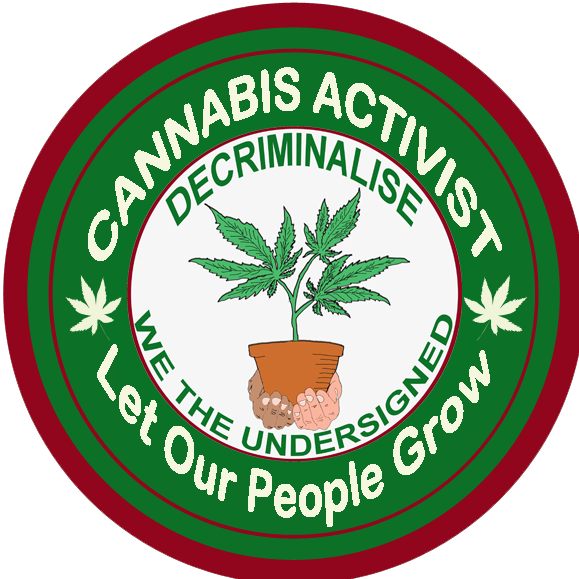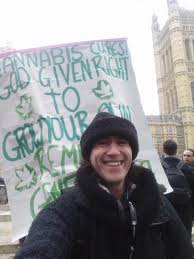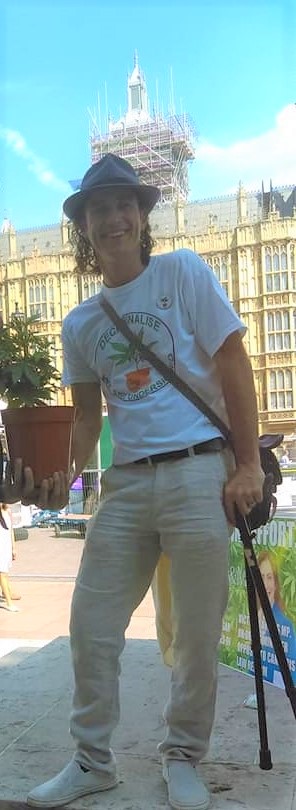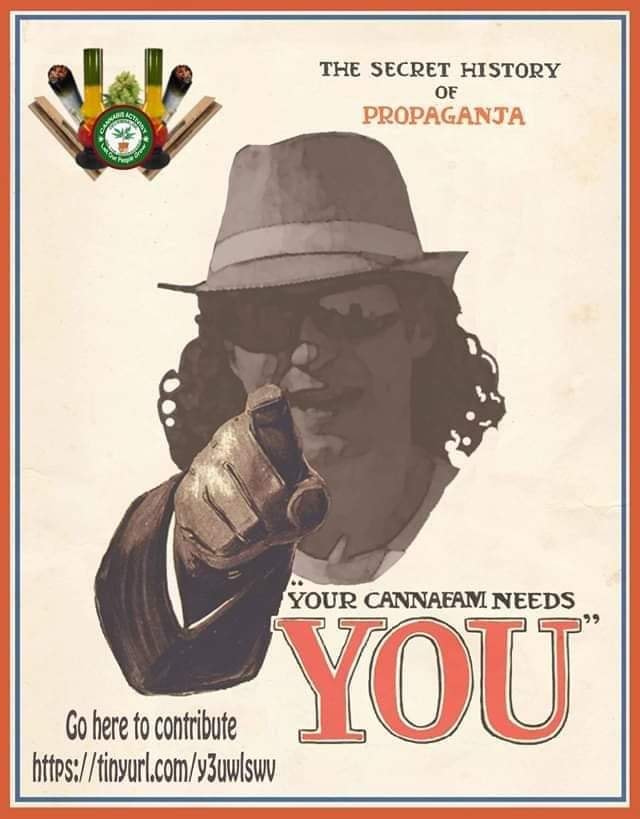A fresh take on British cannabis campaigning: We The Undersigned
Campaigning for wider access to cannabis in the UK has a long and fruitful history. Beginning as a movement for general access to cannabis as a recreational drug before evolving (or devolving depending on your perspective) into a more sophisticated and well-funded campaign specifically designed to enlighten and engage the British public into the wonderful world of the medicinal properties of the once demonised plant.
For many of those with a long history of involvement in the UK cannabis community, the recent involvement of large, multinational corporations in the push for legalising access to “medicinal” cannabis represents a new era of cannabis: a hijacking of a corporate, and sinister, nature.
Cannabis, especially “medical” cannabis, is quickly becoming one of the most lucrative markets in the world. As more and more countries legalise access to cannabis medications, the market of consumers grows, enticing entrepreneurs and campaigners alike.
In 2018, the legal cannabis market in the US was valued at $11.9 billion, with experts anticipating this to expand at a CAGR of 24.1% from 2019 to 2025, with the value of the market expected to reach $66.3 billion by the end of 2025.
This corporate take-over of cannabis has many campaigners, both those new to the game and the old school veterans, scrambling for a more equitable outcome: one where those who prefer to don an attire made from hemp have as much of a voice as their three-pieced counterparts.
Phil Monk is one of those voices. A veteran of campaigning for equal access to cannabis, regardless of whether the use is recreational or medicinal. “I must say that there is no such thing as ‘medical cannabis’,” Phil explains, “There is only cannabis. Well grown or poorly grown, in all its wonderful varieties.”

Like many involved in the UK cannabis campaign, Phil’s use of cannabis began when little was known about the true medicinal potential of cannabis:
“It was only in 2014 that I realised I had been consuming cannabis for therapeutic benefits after I began researching the effect of cannabis on human health.
“I began this research after developing a chronic pain condition and nearly being killed by pharmaceuticals.”
Rather than a gateway to harder drugs as many right-wing media associations would have you believe, cannabis is often used as an “exit drug” from addictive, and potentially life-threatening, pharmaceutical drugs, as Phil himself found.
Like many of those involved in grass roots campaigning for cannabis access, Phil is not just a campaigner, he is also a patient, whose life has been positively impacted by the use of cannabis as a medicine. Rather than subject himself to a life of addiction to pharmaceutical medications, cannabis allowed Phil to take control of his healthcare:
“I have used cannabis from 16 years old, used it before I became physically ill and before I started taking pharmaceutical drugs.

“When I did start taking pharmaceutical drugs to manage my health, they caused me life-threatening hospitalising side-effects, including a brain haemorrhage scare, mini stroke scare, bowel and bladder cancer scare, and a liver cancer scare.
“I have replaced the poisonous recreational drug alcohol and side-effects ridden pharmaceutical drugs with natural herbal cannabis and consume cannabis to manage my health, well-being and happiness and the symptoms of chronic myofascial pain from joint hyper-mobility spectrum disorder, bilateral ulnar impaction syndrome, depression and PTSD from childhood abuses.
“After the pharmaceuticals nearly killed me, I realised the recreational drug I had been using my entire life had done me no harm, realising it had been giving me many benefits.
“I made the informed health decisions replace prescribed drugs and alcohol with cannabis, and now risk 14 years in prison due to my beliefs and practices.”
There are nearly as many campaign groups operating in the UK as there are strains of cannabis. Many of these groups often serve only as a vanity project for their creator: to help them make a name as the “saviour” of cannabis in the UK. Their leaders and members sometimes seem more concerned with their public image than ensuring every person, regardless of their intention, can access cannabis without fear of prosecution.
We The Undersigned (WTU), Phil’s own cannabis campaign group, has been making a name for itself as one operating from a place of compassion and duty, successfully setting itself aside from the crowd.

“I did not decide to set up WTU. I never had any plan, design nor intention to ever found my own campaign group.
“We the Undersigned Human Sovereign Right Cannabis exists because of the response to my spur of the moment idea in March 2018.
“At the time several children and their suffering were in the news. Little Alfie Dingley, Murray Grey and Billy Caldwell.
“The plight of their parents combined with my own pain, misery and suffering infuriated me at the injustice of it all, so I decided to contact every human rights solicitor in the country seeking legal representation to raise legal action against the UK government and its so-called war on cannabis.”
Utilising the wealth of knowledge and experience available from the vibrant and diverse community of cannabis activists available to him, Phil began assembling a fresh take on cannabis activism: utilising the law to challenge the law:
“As I was a part of several other cannabis reform groups, I posted an invitation asking other activists and campaigners if they would like to undersign to my letter, making it a class action about all others rather than just little old me.
“The response was overwhelming.
“I had to create a group and, as I was asking people to undersigned by letter based on human rights to cannabis, the title of the group seem to make sense as ‘We the Undersigned Have Human Sovereign Right Cannabis.’ In hindsight this is a somewhat long title and thankfully we’ve been shortened to WTU.”
With the campaign to legalise cannabis exclusively for medicinal purposes gaining momentum, those with vested interests have begun to make their mark on the progress of the legalisation process, much to the disdain of those who have dedicated their youth and energies to ensuring anyone who needs or wants to access cannabis can do so.
Those who would stand to gain from cannabis being legalised as a medicine only obtainable through a costly prescription have been vocal about their intentions solely being on legalising these medications, rather than wider-access to cannabis as a recreational drug, as well as their desire to prevent patients growing their own plants to make their own medication.
“I must say that there is no such thing as ‘medical cannabis.’ There is only cannabis. Well grown or poorly grown, in all its wonderful varieties.”
– Phil Monk, cannabis warrior & founder of WTU
For campaigners like Phil, this is not an acceptable outcome of years of dedicated service to the cause.
“I do feel represented by other groups, so long as they support the right to grow your own as this is a fundamental part of our human rights cannabis and achieving ‘Herbal Independence Day’ from the extortionate pharmaceutical industry and uncontrolled cannabis market.
“WTU fights for the broader human rights issue of cannabis and not just a narrow medical cannabis issue.

Like many campaign groups, WTU relies solely on donations to fund their ambitious project to end prohibition of cannabis in the UK
“The central aim of WTU would be to see cannabis removed from the misuse of drugs act classifications and the schedules list completely. To repeal cannabis prohibition laws as there should be no criminal or civil sanctions against anybody or choosing to utilise or cultivate cannabis for their own health and well-being.
“So, We the Undersigned seek the decriminalisation of the beliefs and practices of the CannaCommunity and the legal regulation of the cannabis market in order to respect human rights and reduce potential harms.
“I must say that cannabis cannot be decriminalised or legalised. We the oppressed ‘CannaCommunity’ are criminalised, not the plant. Only the actions of the individual can be decriminalised or legalised as law controls individual’s actions not plants, potions nor pills.
“I do not support the Canadian model as it has brought in around 49 laws with which to control punish and profit from the cannabis consumer, creating another government cartel as in the UK.
“I would seek the full decriminalisation of the actions of possessing cultivating preparing or sharing and legal regulation of the cannabis market.
“In short, I would seek equality with the consumers the poisonous recreational drug alcohol. People should have the right to grow their own cannabis, and the right of free association in social clubs and to be able to purchase quality assured cannabis from regulated vendors regardless of the purpose of consumption, whether therapeutic, relaxation, creative, spiritual, tantric, meditation or nutrition.
“The false binary paradigm of medical vs recreational needs to be broken down.
“There are only 2 types of cannabis consumers really. Those who do and those who don’t.
“We should not have to become sick and dying before qualifying for access to cannabis.”
Armed with an impressively extensive knowledge of cannabis, and, perhaps more importantly, of the legal processes which have brought so much pain to cannabis consumers for decades, the WTU’s strategy for legalising access to cannabis is based on the very legal grounds which have prosecuted thousands of users.
“WTU are seeking to raise a human rights based legal challenge against the government’s political policy of ‘the war on cannabis,’ which is really a fraudulent ‘war on the CannaCommunity,’ Phil explains. “We have raised the legal fees to have our case reviewed by a top human rights barrister and we are now building the case in preparation for this.”
Leading experts are joining the WTU campaign, providing the group with much needed legitimacy.
”Professors Mike Barnes and David Nutt have also committed to writing expert reports,” Phil began, adding that the campaign group had already began their own study to help provide as compelling a case as possible in court. “WTU will support [them] with the anecdotal evidence gathered from the WTU case study surveys.”
Phil continued, “assuming the barrister advises that we have grounds for litigation, WTU aims to issue a Declaration of incompatibility between the Human Rights Act and the Misuse of Drugs Act to the Home Office.
“This is similar to what occurred in the South Africa Daga trial, although the UK legal system has different mechanisms which make it more difficult to challenge a law.
“The Home Office’s response to the Declaration of Incompatibility will then determine whether further legal action shall be required.”
Using the law to rectify the years of pain inflicted on thousands of cannabis users is not unique to the WTU, but there is an air of freshness to their cause. While the WTU does have a dedicated group of members, the structure to its organisation does not require fees, not that sustained membership-based campaigns are wrong for requesting donations to sustain their campaign.
There are several ways to get involved with the WTU campaign. Either through their official website, social media page or private group.
WTU has two fundraising campaigns, running solely on donations. The legal fundraiser can be found on their Crowd Justice page, and visit their merchandise for updates on their campaign fundraiser.
Simply, the WTU’s legal challenge will be a one-off, class-action lawsuit. One purpose. One mind.
“Freedom to farm for all,” Phil poeticallty ends.
